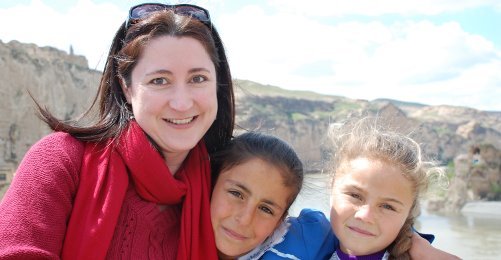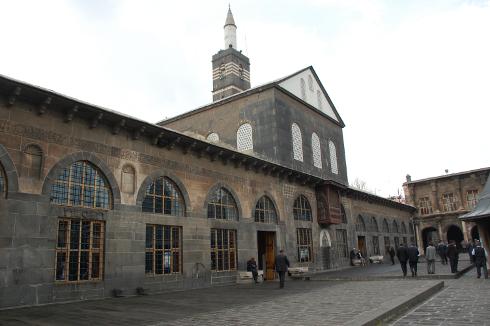My husband, Yahya, and I arrived in Diyarbakir and spent the next three days with our friend Oral Çalışlar's local contact, Aziz Fidanci, who is a local journalist. Of course, as is custom here, he showed us considerable hospitality throughout our stay by insisting on driving us around, showing us the sites and introducing us to different people of all ages. The wonderful breakfast culture we were so impressed by in Van we also found in Diyarbakir. We learned a lot about the situation in Diyarbakir from all these different people because one of our favorite things to do is talk with the local people to get a flavor for what life is like wherever we visit.
In the Ofis neighborhood of Diyarbakir we met Nezir Bey, a local businessman who is also a member of the AK Party. He owns a tea house which is like The Caucus Room in Washington, DC, where all the politicians meet and drink tea. I was surprised when I was invited, along with Yahya and Aziz of course, to sit down and have some "kaçak" ("contraband") tea. Nezir Bey made it a point to come and talk with us as much as he could when he wasn't taking care of his other customers and politicians. I have always viewed tea houses as male domains, which is still the case in reality. Maybe it's because I'm a foreigner, but I didn't hesitate to sit down with the men and drink tea. No one was looking at me oddly or questioning why I was there, so I felt pretty comfortable. Plus, I've always had this secret desire to go to a tea house and challenge one of the local men to a backgammon game! But, my courage only goes so far...
We met a woman from an old Diyarbakir family who complained, like old Istanbul families do, that Diyarbakir does not belong to the old Diyarbakir families anymore because immigration from the villages has turned the city into a big village! She also mentioned that she hates it when she travels to the West (i.e., Istanbul, Izmir, etc.) and people are nice and friendly until they find out where she's from, at which point they become more cold and distant. This was echoed by others we met in Diyarbakir as well.
Aziz also introduced us to three sisters - Nazlı, Şerivan and Songül - who are all in different stages of pursuing their education - high school, university and graduate school. These charming and lovely sisters come from a well-to-do Kurdish family in Diyarbakir and have very modern tastes and habits, contrary to what some Westerners might expect. Of course there are all different types of people in this big city, just as there are in the West. In talking with these sisters about their thoughts, daily life and expectations for the future, we found out that they enjoy as much freedom as females in Istanbul do: they go out, hang out with their friends, go to school, plan on working, etc. Fortunately for them, the concept of "honor" seems to have evolved in their circle.
One of the most surprising things for me to discover was how much has changed in the last 10 years in Diyarbakir. Women have a much better position in society now than they used to, and most people credit the local political parties (such as the former DTP, EDP, etc.). For whatever reason, the DTP was at the forefront of making the lives of women better in this region. They had the highest number of females in their party and as representatives in parliament, and they were focused on making women's lives better. In Diyarbakir, one area they have had success in has been domestic violence. While it has not been totally eliminated, violence against women has allegedly decreased significantly according to various people we talked with.
We spent the next three days in the vicinity of Mardin, Midyat and Nusaybin, which was a bit of a different story. At the time of our visit the region was calm. Despite the calm, we saw military checkpoints, armed village guards and plenty of " Ne Mutlu Türküm Diyene" ("How Happy is He Who Calls Himself a Turk") and "Önce Vatan" ("Motherland First") signs along the road. In addition, we heard bombing from "night exercises" at nearby military forts and military jets flying over the city several times per day.
Of course, it was unthinkable to come all this way and not visit Hasankeyf! In addition to the truly spectacular natural beauty and history, the outgoing, beautiful and friendly children there stole our hearts.
After touring Mardin with our knowledgeable young local tour guide, Zeki, we decided to get something to eat before heading back to our hotel in Midyat. Sitting in a tea garden with a commanding view of the city and valley below, we spotted a restaurant with a sign telling us it was also a women's foundation. So of course we went and ate there at Kamer Cafe & Mutfak. It was about 5 p.m., so there was nobody else there in the small and quaint dining room. We met Filiz, one of the women who runs the cafe, who just happened to know our friend Zozan, the head of the Van Women's Association. She thanked us several times for choosing to eat there, and the food was wonderful! As we ate local foods, such as icli kofte, we talked with Filiz. She told us that the women of Mardin are not as lucky as Diyarbakir's. They face more violence in the home and pressure on them to do as they are told, even the women who were brave enough to be part of this small cafe.
Really, the biggest thing I learned on my trip is how the people in the Southeast want the same things out of life as people in the rest of Turkey. They want to be free to be who they are, to live in peace, to not worry about their security constantly and to be able to provide better lives for themselves and their children.
It is much easier to hate someone from a distance than when you have met them up close and personal. The late Armenian-Turkish journalist Hrant Dink's approach to the Turkish-Armenian problem would also work with the Turkish-Kurdish problem I believe. The Turks from the West should make the effort to travel to the Southeast and talk with the Kurds so each could have a better understanding of each other. But, this can't happen with a pre-packaged tour like you so often find on offer as a vacation package. People should go, eat wonderful meals, visit spectacular sites and spend some time talking with local people with an open heart and mind. Only then can people truly understand the problems of the area and decide for themselves where they stand. I've made my decision and I plan to visit again to renew my connection to the region. (SMA/TK)






